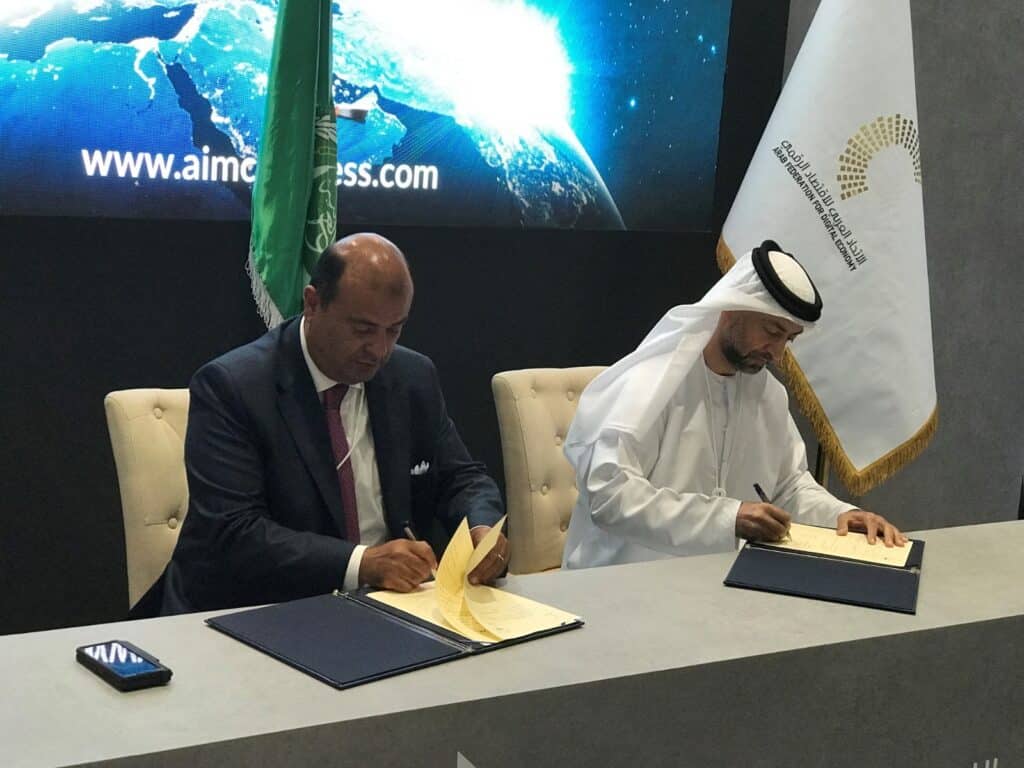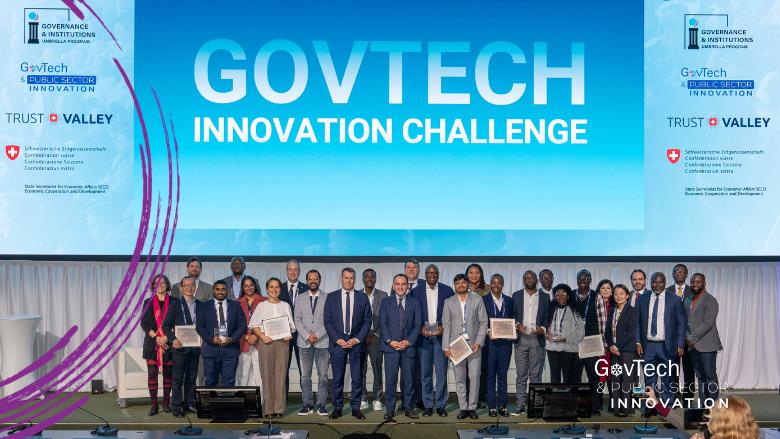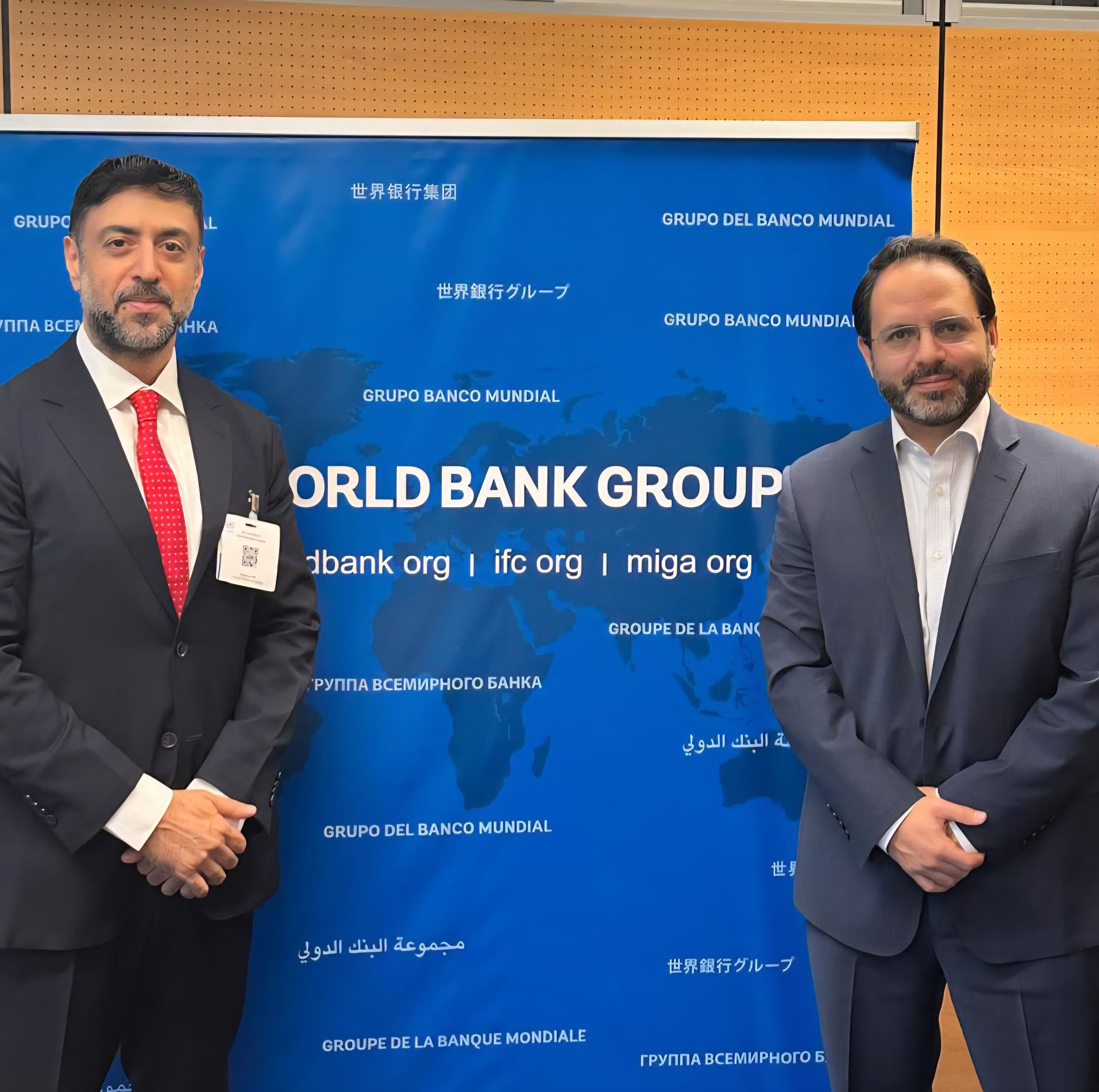Date: May 8, 2023
Abu Dhabi
The Arab Federation for Digital Economy and the Federation of Arab Chambers signed a cooperation agreement during the Entrepreneurship Investment Summit, held in conjunction with the Annual Investment Meeting (AIM) 2023 in Abu Dhabi.
The agreement was signed by His Excellency Dr. Khaled Hanafy, Secretary-General of the Federation of Arab Chambers, and His Excellency Dr. Ali Mohammed Al Khouri, Advisor to the Council of Arab Economic Unity and Chairman of the Board of Directors of the Arab Federation for Digital Economy, in the presence of representatives from both organizations and a host of Arab economic figures.
The agreement defines the objectives and areas of cooperation and the roles of the parties involved, and emphasizes the importance of cooperation to achieve a common Arab vision for the digital economy.

The agreement also aims to strengthen the Arab digital economy, enhance Arab trade exchange, and increase intra-Arab trade rates, which increased by approximately 17.5% in 2021, reaching $112.5 billion, compared to $95.8 billion in 2020. It also aims to achieve Arab food security by leveraging e-commerce and modern technology.
Under the agreement, the two parties commit to expanding the scope of implementation of the Arab Free Trade Agreement and enhancing e-commerce and modern technology capabilities in the Arab region. The e-commerce market in the Middle East and North Africa is ranked the fastest growing in the world, reaching $49 billion by the end of 2022. Sixty percent of consumers in the Arab region now prefer to pay via digital channels when shopping online, a 20% increase from 2021. Companies in the Middle East and North Africa region witnessed a significant recovery in 2021, with the top 100 companies recording combined profits of $201.7 billion, compared to $91 billion in 2020, a 121% increase. Several areas of common interest for cooperation were identified, such as supporting Arab trade exchange activities and increasing Arab commodity exports to the world, which increased by 37.4%, reaching $1,038.2 billion in 2021, compared to $755.6 billion in 2020. Total Arab commodity imports also increased by 8.6%, reaching $810.4 billion in 2021, compared to $746.3 billion in 2020. The agreement also includes coordinating the organization of conferences and events, disseminating information on each activity of common interest, organizing conferences and events on related topics, and promoting the activities and events of each organization for its members.
Under the agreement, the Federation of Arab Chambers will support the projects of the Arab Federation for the Digital Economy, particularly the Arab Food Market, one of the initiatives emerging from the Arab Vision for the Digital Economy adopted at the 31st Arab Summit held in Algeria on November 1-2, 2022, by promoting it to all members of the Arab Chambers of Commerce. In addition to providing studies related to Arab food security and intra-Arab trade,
At the same time, the Arab Federation for Digital Economy will provide technical support to market users and Arab companies, as well as offer consultations and innovative solutions to enhance Arab trade prosperity. It will also work to increase the volume of Arab commodity trade with the world, which witnessed a 23.1 percent increase in 2021, reaching $1,848.6 billion, compared to $1,501.9 billion in 2020.

It is worth noting that the Federation of Arab Chambers is the first Arab economic institution operating at the non-governmental level to embrace the idea of cooperation and economic integration among Arab countries. Its membership includes chambers of commerce, industry, and agriculture and their federations in 22 Arab countries that are members of the League of Arab States, and it represents the Arab private sector. The Federation has played a significant role in advancing trade cooperation between Arab countries at the commercial and investment levels. The Federation was also the first to call for the establishment of a common Arab market and to establish general principles to be implemented with the aim of achieving economic unity among Arab countries.
The Federation of Arab Chambers also supports governmental and civil society efforts aimed at integration and coordination between the economies of Arab countries across all sectors and activities: commercial, industrial, agricultural, financial, investment, service, and other economic sectors and activities.
The two parties value the role of the private sector and encourage participation and investment in future projects and cooperation in implementing joint projects in line with their goals of advancing economic development in Arab countries.











